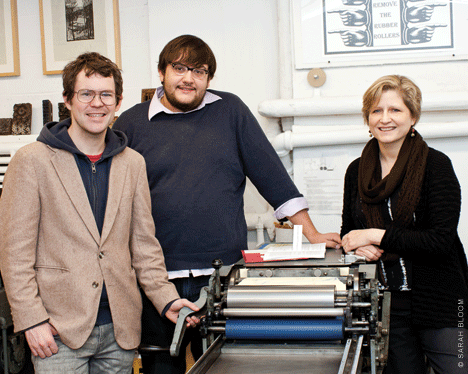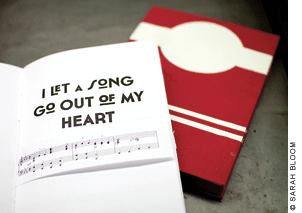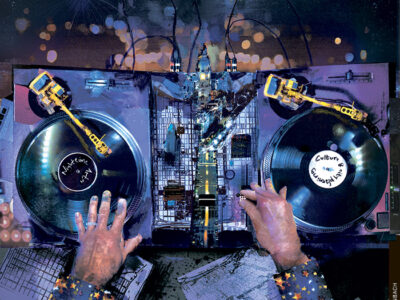
In academia, there are two kinds of awards. The most common ones simply honor achievement. More interesting are those that come with strings attached. Just ask Karen Rile C’80.
Last spring the lecturer in Penn’s Center for Programs in Contemporary Writing (CPCW) was honored with the first annual Beltran Family Award for Innovative Teaching & Mentoring, whose central feature is a $2,200 allowance to be spent on organizing a program at Kelly Writers House.
The Writers House hosts programs all the time. They typically feature guest speakers brought in from the wider world of poetry and prose.
“But of course that didn’t seem very innovative,” Rile says.
In other words, the challenge was on for Rile to prove herself a worthy recipient. And unlike, say, a grant winner, she hadn’t already cooked up some inventive proposal. Rile only found out the award’s existence when friends started congratulating her on Facebook for winning it. When she checked her email, she discovered a formal letter announcing her selection from Al Filries, the Kelly Professor of English, director of the CPCW, and faculty director of Writers House.
The award is the brainchild of Lena and John Paul Beltran, parents of a current Penn undergraduate as well as a recent alumna. With a mind to support “great teaching,” they contacted the Writers House and established an annual fund for the award. After receiving numerous nominations from the Writers House community, Filreis says that Rile became the “consensus choice.”
“We felt that she personally embodied a teacher who did more than just teach,” Filreis explains. “She’s so interested in students being a part of the literary community.”
Before too long, Rile hatched an idea in keeping with that sentiment: figuring out a way to create a letterpress edition of a short story. The funding was there. All she needed to find was a student with experience working with an old-fashioned letterpress—a skill in scarce supply in the age of digital printing—and an author with a story fit to emboss.
Enter Henry Steinberg C’13.
Unlike his fellow Penn undergrads, Steinberg hadn’t spent the previous summer working in a cubicle or a laboratory. He’d hunkered down in a series of pressrooms, painstakingly setting type letter by letter, a sort of old-time journeyman. The rising senior had received funding from the English Department to travel across the country and sharpen his craft under a number of different letterpress printers. Fresh off this unique experience, Steinberg was ready to utilize what he had learned and continue his work at the Robinson Press, run by Kelly Writers House.
Former Writers House program coordinator Erin Gautsche CGS’06 referred Rile to Steinberg, but the project was still missing one key component—a writer. Rile quickly organized a competition open to all writers involved in the Writers House community.

A panel of volunteer judges selected three finalists and presented them to Rile and Steinberg. In the end, the pair selected “I Let a Song Go Out of My Heart” by Sam Allingham, a lecturer and second-year MFA student at Temple University.
Allingham originally became involved with the Writers House through Craigslist. In 2006, he spotted a job opening on the website for an administrative assistant. Though he has since left that job, he remains a regular at the programs there.
The flexible structure of Allingham’s story was a key attraction. His submission comprised a collection of letters narrated by Artie Shaw that centered upon the famous jazz clarinetist’s often-forgotten writing career. Due to space constraints, the threesome decided to include only the last letter, while extracting elements from other epistles in the original collection.
“There were other wonderful stories,” Rile says. “But Sam’s story was ultimately chosen because it was so perfect for the project.”
Once the actual story was set, Allingham entrusted it to Steinberg’s print and design talents.
“When Henry gives a suggestion about what he wants to do with the work, I almost always say yes,” Allingham says. “He’s got good taste and I’ve seen his work; I trust him to do a good job by it.”
The printing process is not as primitive as one might suspect. Steinberg designed the letterpress edition on a computer using Adobe InDesign. The digital schematic then served as a blueprint for the physical process of letterpress printing, which is what appealed to Steinberg.
“There’s an element of danger to it which I really like,” Steinberg says while demonstrating the raw power of the letterpresses in the Morgan Building basement—where a gas mask hangs on the wall as protection against toxic vapors and sulfur dioxide, two among many hazards of the printer’s art.
Steinberg, a tall, imposing figure who sports a scruffy beard, not only looks the part, but also has a family history in printing.
“After I started doing handset typography and letterpress printing, I found out that [my great-grandfather] was a linotype operator in the 1940s in the Lower East Side of Manhattan,” says Steinberg, whose father, Harris Steinberg C’78 GAr’82, is the founding executive director of PennPraxis.
For this project, Steinberg sifted through old songbooks in Penn’s Albrecht Music Library and explored “Art Deco design sensibilities” for inspiration. The book also includes “musical interjections” featuring sheet music for a clarinet in the Duke Ellington composition that shares its name with Allingham’s short story.
The official release and publication party was scheduled to be held at the Writers House on February 19. However, Rile hopes that her project reverberates more widely in the Writers House community.
“One of my goals for the project,” Rile says, “is to show people that what you make out of your life is often not related to the specific, narrow academic subjects you may have taken, but rather the whole experience and the resources of the University.”
For a self-taught letterpress printer like Steinberg, those resources have made all the difference.
—Matt Fernandez C’14




